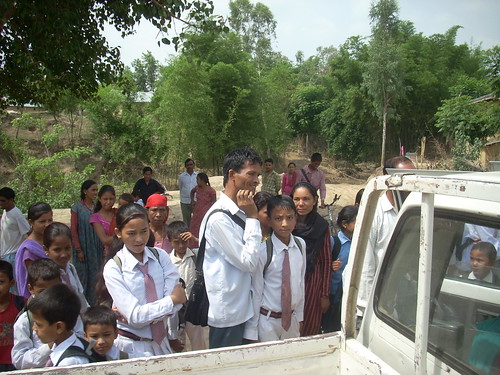6/29/20012
Working in international development has taught me one thing and that is no matter how good your plans sound on paper they will always change on the ground. Usually it is because something goes wrong. I am so used to this that if I don’t have at least 2 false starts and 3 “crises” per project, I start to think that the project was not bold enough. Usually these are problems that you expected or situations that you didn’t, they boil down to the project is not working because of x and then you fix X. Here in Nepal I ran into a different type of problem and it is an interesting tale of how things sometime work out.
BASE is involved in setting up Child Friendly Villages (CFV), the point of these villages is that the families are provided with training and resources to ensure that no child is sent into bonded labour or child labour. One of the main features of these villages is a Child Club. These clubs are supposed to promote children’s rights, independence and creativity. They are for children aged 6-16 and are mainly run by the older members. These clubs help the children participate in the community and give them leadership abilities.
However, when we visited one village the child club had a different purpose. The child club was running a micro-credit program. For anyone who does not have experience in Micro-finance, let me just put it out there micro-finance is hard. I mean very hard, I once tried to do some micro-enterprise with a group of women, trying to raise chickens for eggs and keep some to feed underweight children and sell the rest; let’s just say it did not make money. For a club with a 14 year old treasurer to be running what appears to be a successful micro-lending program borders on amazing. When I was 14 I couldn’t even manage to keep track of the $10 I had in my wallet every now and again much less a village wide micro-credit program. Yet this is also leads to the question what is the point of the child club?
This club is having trouble, because as anyone can tell you when money gets involved things get more complicated. The children find that they are being pressured by the parents, who feel that since they give the children the 5 rupees a meeting to put in the child fund that they are entitled to a say where it should go. The head of the local child committee believes this micro-credit is wonderful and has greatly helped the village members. Yet one would have to ask whether it is still a child club? To the outsider it looks more like a micro-lending program that is run by children and their parents. Is this a good thing? Yes. Is it why a child club was set up? No.
So the question is what do you do? This is an obstacle in the sense that it is stopping the club from doing what it is supposes to do, but it is not an obstacle in the traditional sense. The question is how you preserve the good that the club does, well changing much of the club activities. Can you just spin the micro-credit program off into something else entirely and start the club from scratch? Will people still have interest in the child club; will there be any funding left for the club activities? How do we get the parents to be supportive, but not overwhelm the club?
These are the fun problems to have. At BASE there are 23 programs. Problems like these are the ones people hope to get. How does one get those who are motivated to slightly modify their work and create more than 1 successful activity? The answer is through education, monitoring and ingenuity. It shows though that the work is never done, even the best intentions cause issues and that only through hard work and monitoring can one makes sure all is on track.
Posted By Alex Kelly
Posted Jul 29th, 2012




2 Comments
Andrew
July 29, 2012
It’s great when a community takes to a program like this and really invests in it. However, if they change it so much that the main purpose of the program is compromised, then how do you make sure that the kids are still being given the opportunity to learn leadership and other important skills?
This is a tough situation to be sure, which will take some diplomacy to resolve. Let us know how it turns out – can the parents be convinced to sit back and let their kids work independently, or will the club have to be gently guided back to its original purpose?